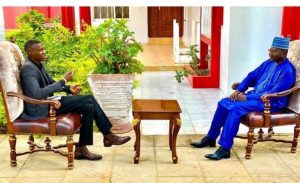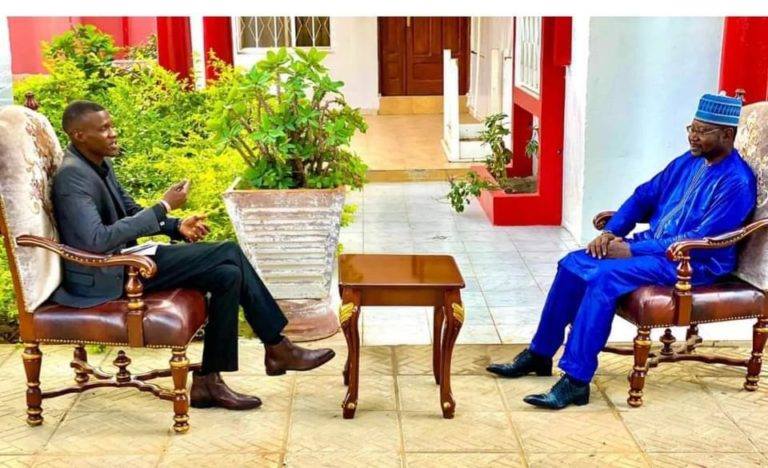
Alagi Yorro Jallow.
Fatoumatta: The consummate and professional journalists are a special breed. They see the world as theirs to mold in the image of whatever is suitable and desirable. They are vulnerable and, at the same time, impregnable. They do not worship in the shrines of gods that fight the helpless. On the contrary, they are guardian angels of those things classified as a public good. A CNN program anchor once immodestly described journalism as the best job in the whole world. However, the journalist has very few friends. He is not a fool; he knows. He knows the flashes of smiles that receive him in places his assignments take him are crocodile smiles. He knows the work he does opens doors for him and, in equal measure, closes doors against him. He knows the society merely tolerates him and silently wishes he would quietly vanish into the dark of the night.
All eyes are on the journalist whatever he does. The Fula people have a song warning he who is being watched by all eyes to tread softly. Lives and careers have been built or interred by the actions and inactions of superman, who decides what the people must know and what they must believe. When the media offends you, you cannot frontally charge at it. Why? You must pass the message without suggesting that you are giving any notification.
Fatoumatta: What you say against the private media in your soundproof bedroom, you cannot say at the palace square. Mitt Romney, who had the unenviable luck of running against mercurial Barack Obama in the 2012 United States Presidential election, got frustrated by what he thought was a media determined to ensure his defeat in that election. At a dinner for Catholic humanitarian causes, he attacked the media without attacking it. He said: “Now I never suggest that the press is biased, I recognize that they have their job to do, and I have my job to do. My job is to lay out a positive vision for the future of the country, and their job is to make sure no one else finds out about it.” That was the abysmal degree of trust that existed between him and the press. Politicians never really like the media and its practitioners. The media, too, looks at the political class with utmost suspicion, sometimes with indignation, sometimes with disgust. Both always have agendas that are always not of the same color and texture.
When the media chooses the politician to fight, it does not matter who he is. He could even be a journalist himself; when he crosses over to the other side, he becomes a suspect. He becomes susceptible to all the vagaries that go with operating in the privileged concave of oppressors. For the journalist, war never ends until he is the victor. Steely resolve is wired into him. It is in his DNA. So what happens when the battle is between journalists and others who claim journalism as their vocation/avocation? Two forces with claims of invincibility are likely to wreck the shrubs of the forest. Their chosen standoff promises to be interminable.
Fatoumatta: I felt so with Journalist Modou Lamin Jammeh, presenter Ifangbondi episode with the Eye Africa Television. He attracted to himself, the kind of focus no one prays to have. He had chosen the actual hardship journalists face with politicians who are not media-friendly but want to use journalists to serve them with exaggerated propaganda and misinformation agenda since we are in a political season. Mr. Jammeh is judged and misunderstood that, despite the noise in the private media about hardship in the Gambia, I felt when I read it was horror that we chose social media to ventilate our views about the condition of the Gambian economy and politics. The terrain Mr. Jammeh decided on was not a traditional battleground for a media general like him. Moreover, I am sure he has found out that that terrain is as treacherous in its anonymity as it is lethal in the speed and spread of its bullets. Mr. Jammeh’s creativity in the context of expression and investigative journalism approach manages to extract whatever little that is practically possible from his guest interviews by squeezing water from a stone or try to get blood out of a rock.
Nevertheless, over the years, the ace journalist’s name has not stopped trending online. First, he must have felt a feeling of shock, then anger, at the depth and breadth of the online media attacks that followed that Ifangbondi episode on social media. He is not used to being silenced or having his rights curtailed by whoever. Progressive Gambians and the people in government and the opposition can testify to his sustained personal bravery, indomitable fighting spirit, and gallantry. Furthermore, he first came out with a brand and style of investigative journalism techniques explaining himself, but what exists in social media is an implacable mob. Once you cross the line drawn by the unwritten rule of online engagement, you do not attempt to explain your position in a self-righteous manner.
The mob will charge harder at you. I do not know why the ace journalist thought silence after that message would not have been a better strategy against a force seething with populist anger. However, a well trained in struggles and battles of ideas, he followed up that ‘explanation’ with another shot, aimed at his traducers: “Lynch-mob, cyber-hyenas, cyber-vandals, character assassins: this is the motley crowd that has seized the Gambia’s social media space, either on Facebook or Twitter or Instagram. It is a mob and functions like any other mob, pouncing on targets, remorselessly, twisting your words to achieve a preconceived end.” Interesting!
Fatoumatta: Would Mr. Jammeh have published his interview with a politician if he was in government or opposition? No one in government pushes anything into the media without a goal. Did Mr. Jammeh achieve his objective at the end of the day? He has been around for a long time. He had been in the trenches fighting the people’s cause. However, in the slippery terrain of today’s angry, hungry Gambian, heroic acts of yesterday never serve as one’s armor, especially if one is now an apparent member of the power elite. The people’s activist politician of yesterday is the big boss, and a leader of a political party today drills a chink in his armor. He should know. He is no longer untouchable. He has lost his innocence.
I do not know how many persons politicians in government and the opposition today wish to be exposed to the unfriendly, harsh realities of a media that does not take prisoners. When you work in government or become a powerful politician in the opposition, all eyes, seen and unseen, are watching you. You must therefore choose what to say and what to write. Defending any politician in government and opposition anywhere is one of the most challenging jobs. You write and cancel words and write again. You query your every sentence and give answers to every unasked question before you push the information out. It becomes particularly tricky and risky when social media is the preferred channel. Social media is an agent of change. It is a democracy bearing another name. That, ironically, makes it a forest of doves, lions, snakes, and scorpions. The doves are very few, and they do not stick out their fragile necks in defense of persons marked for online demolition. On social media, warriors have no place in their hearts to think of taking prisoners.
Experience in politics and government teaches better than the best teacher. For the journalist in private as in government, every experience, no matter how unpleasant, enriches one’s appreciation of that thing called power and its demands. Moreover, it is not as if the system itself is appreciative of valiant efforts. On the contrary, it has a way of throwing the unwary to the dogs. It is the very home of treachery. However, you become a better journalist only after going through education, job training, audacity, humanity, humor, guts, and fearless storytelling, especially if you are wise.

